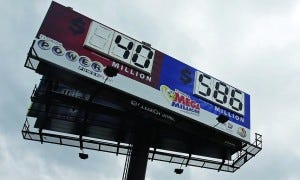It’s not a lottery ticket, it’s a company
After some recent initial meetings with founders, I have been left wondering if they’re building a company or buying a lottery ticket. The press around $billion valuations and the public estimates of personal wealth of the founders who guide their companies to IPO is driving this worry. In my mind, these stories serve the same purpose as the MegaMillions billboards that show the size of the pot — both drive more players to enter the game. In the lottery, the publicity actually reduces the percentage of players who win and shrinks the winnings of the few who do hit the number. In startups, it encourages people to start companies for the wrong reasons and to manage them with the wrong mindset.
Some thoughts on the Lottery
Like a start-up, the expected value is negative. Odds of winning the lottery are roughly 1 in 176 million. Research on the number of players suggests that the best odds of winning occur when the prize hits $420 million, but even then the “expected value” of a $1 lottery ticket is just 69 cents (before taxes). Play the lottery for entertainment. Build a company with a purpose.
Chasing the big jackpot doesn’t pay. With the lottery bigger prizes actually yield lower expected payouts as the increase in the number of players reduces the odds of any one player winning. Walter Hickey found a polynomial relationship between the number of players and the size of the jackpot — growth in the number of players actually accelerates as the jackpot grows.
The same effect applies to startups as sectors generate a jackpot — look at how crowded location based, photo-sharing or messaging apps became. Hickey does not talk about this, but my sense is the slope of the curve rises in some direct relationship to the media attention the prize gets, and I would not be surprised if this relationship was exponential.
Lottery players are short-term greedy, not long-term greedy. The majority of Jackpot winners prefer to take all cash upfront rather than in an annual 30-payment annuity. In order to get cash upfront, the winners take a huge discount vs. the advertised value of the pot — almost a 50% discount before tax. If it’s just about the money, and you have a short-term mindset or a bias toward instant gratification, you are unlikely to maximize your opportunity at a startup.
Lottery players put their faith in the wrong things. The stores that have successful lottery winners become famous and attract new customers to purchase tickets, and people will wait in line for three hours to buy tickets at “hot” stores. We have sold our share of “winning tickets” at First Round, and our community has raised money from every top tier venture fund in the valley, but when you start defining success based on where you bought the ticket instead of the return on the ticket, you have a problem.
Lottery winners assume there will always be more money. This is false. According to Don McNay, author of the book “Son of a Son of a Gambler: winners, Losers and What to Do when you win the lottery,” 9 out of 10 winners go through their money in five years or less. I don’t need to repeat the discussion on burn rate, but I’m noting the parallel with lottery players.
A meeting I had yesterday brought this back to the top of my mind because it was a stark contrast to the lottery ticket approach. I met a founder who is building a company to scale a product he has been offering for years. He has seen the power of this product and has created a company to get his idea and the benefits of his product to as many people as possible. He is not choosing to buy a ticket in a game he thinks he can win. He is not concerned with his odds or the size of the pot. He is waking up every day to do the only thing he knows how — get this product in people’s hands. I think he will win, and I hope to meet many more people like him.
Thanks to Heston for being a thought partner on the lottery metaphor.



